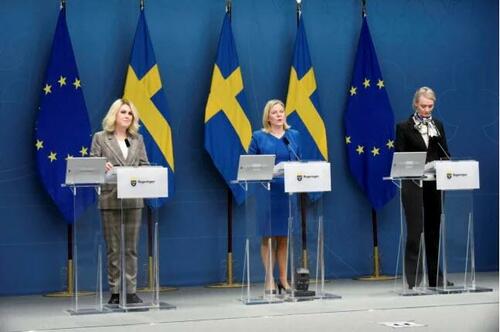“We Can Open Up Society”: Sweden Lifts Nearly All Covid-19 Restrictions
In a press conference on Thursday morning, the Swedish government announced plans to remove the majority of restrictions against Covid-19 on February 9th, the Local.se reported.
Prime Minister Magdalena Andersson, Health Minister Lena Hallengren and the Director General of the Public Health Agency, Karin Tegmark Wisell, announced that almost all restrictions will be removed on February 9th, and that those working from home should prepare to return to work.

“The pandemic is not over, but is entering a completely new phase,” said Andersson. “We are nearing the point for Sweden to open up again.”
The government explained that the decision to open up was based on a number of factors, partly that Omicron appears to be a milder variant of the virus, and partly that the percentage of Sweden’s population who are fully vaccinated or have taken a booster dose continues to increase.
“There are multiple international studies of a milder illness, and the data we have from Sweden paints the same picture,” Andersson explained. “The rate of vaccination in Sweden has been high in recent weeks,” she continued, stating that this means that “we can open up society, at least for all who have been vaccinated”.
Almost 50 percent of over-18s in Sweden have received their third dose of the vaccine, and more than 86 percent of over-12s have received their first dose. Sweden does not recommend the Covid vaccines to children under the age of 12, unless they are particularly at risk.
Health Minister Lena Hallengren also stated that “the government is planning on removing travel restrictions introduced on December 21st for the Nordic countries”, stating that they would provide more information as soon as it was possible.
She didn’t say anything about travel restrictions for other countries. Sweden’s current entry rules for EU/EEA arrivals are currently in place until February 28th, and March 31st for people travelling from other countries.
In terms of returning to work and higher education, Hallengren stated that “in order to prevent a new wave, the return to work and school should occur successively”.
Which restrictions will be removed?
The following restrictions will be removed next week:
-
Indoor events of 20-50 people must be seated, with max 8 per group and one metre between groups
-
Vaccination pass needed for indoor events with more than 50 attendees
-
Trade shows and markets indoors must require a vaccine pass if they have more than 50 guests, and number of guests is capped at 500, with 10 square metres per person
-
Restaurants must close at 11pm, with alcohol serving ending at 10.30pm
-
Groups at restaurants may consist of a maximum of eight people, with a minimum of one metre between groups
-
Restaurants with conserts or other entertainment may only have seated guests
-
Maximum of 20 people at private parties in hired venues
-
Shops must have a maximum number of guests permitted, calculated on area with 10 square metres per person – this also applies to gyms, museums, art galleries, theme parks and swimming pools
-
Long-distance public transport: all travellers must have a seat, if possible
In addition to this, special recommendations for those who have not yet been vaccinated will remain, as well as recommendations to stay home when sick, or if you suspect you may have Covid-19.
Covid-19 ‘no longer a danger to society’
The Public Health Agency also believes that Covid-19 should no longer be classified as an illness presenting a danger to society. Therefore, the agency has sent a request to the government in order to reclassify the illness.
“The government will process this request in a swift manner and will also put forward a law proposal to reclassify Covid-19,” Hallengren said, indicating that this could happen by the end of March. After the government has submitted these proposals, parliament will make the final decision on whether to approve them or not.
Sweden confirmed its highest number of daily new cases of Covid-19 last week, the highest level yet during the pandemic. There was also a clear rise in the number of Covid-linked deaths and intensive care admissions last month, albeit not as much as during previous waves.
With over 16,000 fatalities so far, Sweden’s death toll is in line with the European average, but is far higher than those of neighbouring Norway, Finland and Denmark.
Denmark on Tuesday became the first European Union country to lift most of its domestic Covid-19 restrictions, followed later in the day by Norway.
Tyler Durden
Thu, 02/03/2022 – 11:00
Zero Hedge’s mission is to widen the scope of financial, economic and political information available to the professional investing public, to skeptically examine and, where necessary, attack the flaccid institution that financial journalism has become, to liberate oppressed knowledge, to provide analysis uninhibited by political constraint and to facilitate information’s unending quest for freedom. Visit https://www.zerohedge.com
